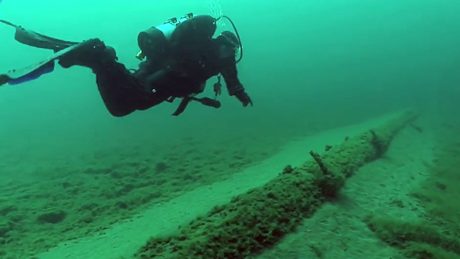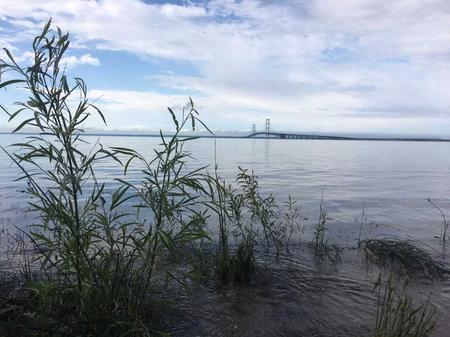What’s Stopping Michigan from Shutting Down Enbridge’s Line 5?
“What we’re getting is all the risk from this pipeline and really none of the economic benefit.”

The Line 5 pipeline carries petroleum products 645 miles from Wisconsin to Ontario in two pipes that sit in the water along the lake bed.

The growing concern over an aging oil and gas pipeline under the Straits of Mackinac has reached a new level.
Last week, Enbridge Energy confirmed that its Line 5 pipeline is missing protective coating in several areas of the pipeline and bare metal is exposed to the elements.
That has prompted a number of environmental groups to renew calls to shut down the pipeline. It has also forced a number of politicians and state officials — both Democrat and Republican — to issue statements regarding Line 5 and the risk of continuing its use in one of the most environmentally sensitive areas of Michigan.
The news was enough to prompt Gov. Rick Snyder to say he’s “greatly concerned” about the pipeline. He released this statement:
“Protection of Michigan’s natural resources is of utmost importance, and I am greatly concerned by the new information regarding Line 5. I have directed our departments to accelerate an aggressive review of Enbridge operations and maintenance procedures throughout the state.”
Is it time to shut down the 60-year-old pipeline? Why hasn’t the line been shut down already? What would be the costs and benefits of shutting down Line 5 — both environmental and economic?
Detroit Today invited a representative from Enbridge Energy to participate in this conversation, but Enbridge did not respond to the invitation.
Host Stephen Henderson speaks with two people who have been following the situation closely and who have different takes on the proper response.
Phil Roos is board president of the Michigan League of Conservation Voters, which is calling on the state to shut down the pipeline. He says most of the oil going through the pipeline passes through Michigan to eastern Canada for export. Roos says relatively little of the oil and gas is actually used here in Michigan.
“In terms of disruption to our economy in Michigan, there’s really nothing to speak of there,” he says.
“What we’re getting is all the risk from this pipeline and really none of the economic benefit,” Roos continues.
Jason Hayes is environmental policy director for the Mackinac Center for Public Policy, a group that promotes free market policies in Michigan. He says Line 5 should not be shut down right now.
“It absolutely would be catastrophic if there was a spill, there’s no doubt about that,” says Hayes. “There’s several reasons why we’re doing this. And… it’s not just just that we’re doing it just to get a thrill from the risk. There’s more to… the reasons behind it.”
Hayes says the oil and gas that come through the line does benefit Michiganders and helps keep energy affordable here. He says more work needs to be done to figure out the best alternative to moving oil and gas through the pipeline.
“If we’re going to replace it, if we’re going to close it down, then we need to find some way to replace that volume.”
Click on the audio player above to hear the full conversation.
